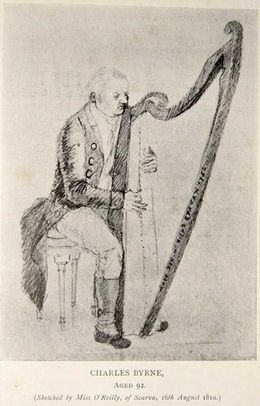Annotation:Young James Plunkett: Difference between revisions
No edit summary |
m (Text replacement - "Century Gothic" to "sans-serif") |
||
| (2 intermediate revisions by one other user not shown) | |||
| Line 1: | Line 1: | ||
== | __NOABC__ | ||
<div class="noprint"> | |||
<p><font face="sans-serif" size="4"> Back to [[{{BASEPAGENAME}}]] </font></p> | |||
</div> | |||
---- | ---- | ||
<p><font face=" | {{#lst:{{PAGENAME}}|abc}} | ||
---- | |||
<div style="page-break-before:always"></div> | |||
<p><font face="sans-serif" size="2"> | |||
<div style="text-align: justify; direction: ltr; margin-bottom: 90px; margin-left: 70px; margin-right: 120px;"> | |||
<br> | <br> | ||
'''YOUNG JAMES PLUNKET''' (Seamas Óg Pluincead). Irish, Air (2/4 time). G Major. Standard tuning (fiddle). AB. O'Sullivan (1983) believes perhaps the melody and almost certainly the words were the composition of the blind Irish harper Turlough O'Carolan [http://en.wikipedia.org/wiki/Turlough_O%27Carolan] (1670-1738), although Edward Bunting (1773-1843) declined to attribute it to the bard. Various possibilities exist for the identity of 'young James Plunkett,' a member no doubt of a celebrated Roscommon family. Hardiman (1831) identifies him as James Plunkett of Bunenedin, County Sligo, while a MS version notes "The seat of Mr. Plunkett, near Mr. Brown's of Cloonfad in the parish of Aughrim, Co. Roscommon." Yet another MS gives "James Plunkett of Kilanadin near Elphin died at Patt. McGarry's in the greatest distress." A variant of this melody is the Connemara song "[[Moll Dubh a' Ghleanna]]," notes O'Sullivan (1983). | |||
<br> | <br> | ||
</div> | |||
</font></p> | </font></p> | ||
<p><font face=" | <div class="noprint"> | ||
[[File:charles byrne harp.jpg| | <p><font face="sans-serif" size="2"> '''Additional notes''' </font></p> | ||
''Source for notated version'': the Irish collector Edward Bunting [http://en.wikipedia.org/wiki/Edward_Bunting] noted this version of the tune from the harper Charles Byrne, probably at the end of the 18th century. | <p><font face="sans-serif" size="2"> | ||
[[File:charles byrne harp.jpg|260px|thumb|left|Charles Byrne]] | |||
<font color=red>''Source for notated version''</font>: - the Irish collector Edward Bunting [http://en.wikipedia.org/wiki/Edward_Bunting] noted this version of the tune from the harper Charles Byrne, probably at the end of the 18th century. | |||
<br> | <br> | ||
<br> | <br> | ||
</font></p> | </font></p> | ||
<p><font face=" | <p><font face="sans-serif" size="2"> | ||
''Printed sources'': Bunting ('''Ancient Music of Ireland'''), 1840; No. 32, p. 26. O'Sullivan/Bunting, 1983; No. 32, pp. 50-51. | <font color=red>''Printed sources''</font> : - Bunting ('''Ancient Music of Ireland'''), 1840; No. 32, p. 26. O'Sullivan/Bunting, 1983; No. 32, pp. 50-51. | ||
<br> | <br> | ||
<br> | <br> | ||
</font></p> | </font></p> | ||
<p><font face=" | <p><font face="sans-serif" size="2"> | ||
''Recorded sources'': <font color=teal></font> | <font color=red>''Recorded sources'': </font> <font color=teal> - </font> | ||
</font></p> | </font></p> | ||
<br> | <br> | ||
---- | ---- | ||
== | <p><font face="sans-serif" size="4"> Back to [[{{BASEPAGENAME}}]] </font></p> | ||
</div> | |||
__NOEDITSECTION__ | |||
__NOTITLE__ | |||
Latest revision as of 20:05, 6 May 2019
X:1 T:Young James Plunket M:C L:1/8 R:Air N:”Author and date unknown” Q:"Quick and Lively" B:Bunting – Ancient Music of Ireland (1840, No. 32, p. 26) Z:AK/Fiddler’s Companion K:G D|.G2 (.G.G) [B2d2g2] .g.f|(ef)(ed) .B2 (Bd)|(ef)(ge) {f}(ed)(cB)|(AB)(AG) (.E.E .E2)| (GA)(BG) .g2 gf|(ef)(ed) .B2 (Bd)|(ef)(ge) .d2 (cB)|{AB}.c2 (BA) (.G.G .G2)| .G2 (AB) .G2 (AB)|{^c}.d2 (de) (dB)(AG)|.G2 (.G.G) [B2d2g2] (gf)|(ef)(ed) .B2 z2| {c}(BA)Bd {f}edef|(gf)(gd) (BA)(Bd)|(ef)(ge) (dB)(AB)|(GE)(DE) G2z2||
YOUNG JAMES PLUNKET (Seamas Óg Pluincead). Irish, Air (2/4 time). G Major. Standard tuning (fiddle). AB. O'Sullivan (1983) believes perhaps the melody and almost certainly the words were the composition of the blind Irish harper Turlough O'Carolan [1] (1670-1738), although Edward Bunting (1773-1843) declined to attribute it to the bard. Various possibilities exist for the identity of 'young James Plunkett,' a member no doubt of a celebrated Roscommon family. Hardiman (1831) identifies him as James Plunkett of Bunenedin, County Sligo, while a MS version notes "The seat of Mr. Plunkett, near Mr. Brown's of Cloonfad in the parish of Aughrim, Co. Roscommon." Yet another MS gives "James Plunkett of Kilanadin near Elphin died at Patt. McGarry's in the greatest distress." A variant of this melody is the Connemara song "Moll Dubh a' Ghleanna," notes O'Sullivan (1983).

